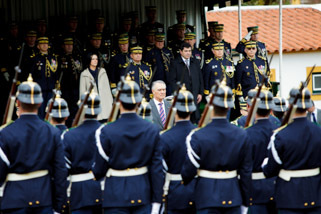
I was very pleased to accept the invitation to take part in this tribute to Vasco Graça Moura, promoted by several of his many friends and admirers.
Vasco and I have been friends for many years. And my admiration for him and for his work is certainly much longer.
I could thus not refuse coming to Porto today, his birthplace, and join together with all those who wanted to attend this party, to signal the 50 years of Vasco Graça Moura’s literary life.
I was asked to say a few words. However, in the face of such an extensive curriculum and such a fulfilled biography as those of Vasco Graça Moura, I was troubled by a doubt: what could I say that had not already been said, either in this same session, or in the most diverse publications, by authors knowledgeable in the many fields where he has developed his activities?
Shall I speak of the writer, or of the politician?
Of the cultural director, or of the columnist?
Of the translator of classic works, or of the author of words for “fado” songs?
Of the consensual Graça Moura, who performed and performs high offices in our public administration, or of the controversial Graça Moura, fiery polemicist, who does not spare his adversaries when he fights for his beliefs?
We must conclude that it is not easy to find the right approach to correctly picture such a multifaceted individuality.
Luckily I did not come here today purely as a private individual, to reiterate my respect and admiration for the person and the work of Vasco Graça Moura.
I also came here to publicly testify the recognition of the Portuguese, for all he has accomplished on behalf of our culture, of our language, in short, of our Country. And, as such, my task is a lot easier.
The figure of Vasco Graça Moura is so largely clear in the Portuguese and even in the European intellectual horizon, that no further eulogies are necessary to confirm his true dimension and to justify the tribute we are paying him today.
I will thus try to stick to the essential.
Graça Moura is above all a poet and a novelist, who gave to the latter half century of Portuguese literature some of its most beautiful and original pages. Not by chance, many of such pages have already been translated into several languages.
Graça Moura has, in addition, dedicated either to literature or to painting or yet to Portuguese history, several essays that are an obligatory references in studies of our culture. I recall, for instance, the erudition, the minuteness and the imagination that are visible in his studies over Camões.
Graça Moura is equally the translator of many of the more emblematic works in European culture. Dante, Petrarch, Shakespeare and many other authors, whose works are part of the human heritage, were recreated by him in Portuguese. Only someone with the tenacity, the knowledge and, why not say so, the genius of a Graça Moura, could translate those authors as he has done, possibly such as cannot be found in any other language.
Poet, novelist, essayist, translator, in any of the literary genres in which he ventures, Graça Moura has always had the talent to be simultaneously faithful to Portuguese roots and to the great European culture.
He speaks of Porto and of Matosinhos, as he does of Florence or Byzantium.
He writes about the Treaty of Tordesilllas, with the same subtlety that he comments on Graça Morais.
He speaks and writes passionately about Camões, and considers the Poet as the most relevant individuality in our history but, at the same time, he underlines the form in which Os Lusíadas comprise ancient culture and the knowledge of its epoch, assuming the dimension of a universal work.
I recall his words, written quite a few years ago: «the first key to the universality of Camões lies in his having learnt to be a European poet». My belief is that the same words could also be said of him.
All of Graça Moura’s work is, in effect, permeated with European values, it breathes the Old Continent’s civilization and culture, and it believes Portugal is in the horizon of a Europe of nations.
It was thus not surprising to see him, during a decade, as a brilliant Member of the European Parliament, as we had already watched him, with identical brilliance, perform relevant duties in Parliament, in the Government and in several public institutions.
Ladies and Gentlemen,
History tells that one day Petrarch travelled to his birthplace, and that his friends took him on a visit to the house where he was born, warranting that the city would never allow that those walls or furniture would ever be touched. My dear Vasco, neither I or your friends here today to pay you this tribute will ever be able to guarantee to Petrarch’s translator that the city of Porto will preserve your origins, in Foz do Douro, with the same scruples that the city of Arezzo wished to preserve those of its poet.
What we can guarantee, however, apart from our admiration and friendship, is that your work has for long had a captive place in Portuguese literature, and that your work on behalf of our culture has not been in vain.
We sincerely hope that it continues, with the same energy and the same profligacy.
We hope, finally, that the Will and Testament that Vasco Graça Moura wrote, rather precipitately, in 2002, continues, for many years yet, to be just that which it always was: one more of his magnificent poems.
Thank you.
© 2006-2016 Presidency of the Portuguese Republic
You have gained access to the records of the Official Site of the Presidency of the Republic from 9 March 2006 to 9 March 2016.
The contents available here were entered in the site during the 10 year period covering the two mandates of President of the Republic Aníbal Cavaco Silva.